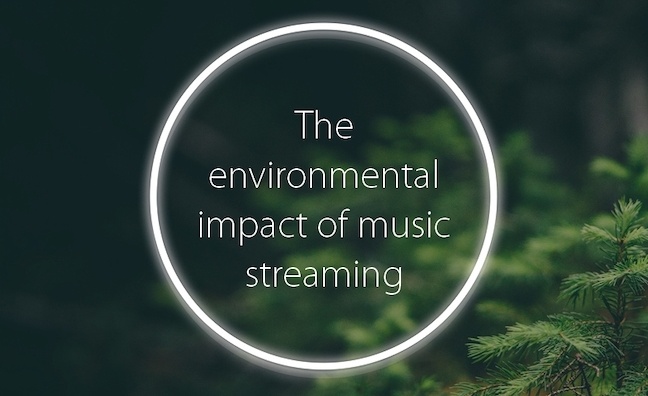Music Week Awards sponsors MQA invite us to consider the impact of streaming on the planet...
Did you know that music streaming has a carbon footprint? In fact, it’s twice as large as the carbon footprint of the CD era. While it’s easy to understand the effects of manufacturing and distributing physical formats such as CD and vinyl, many people don’t realise that streaming also has an environmental impact. Digital music files are stored on servers. Every time you stream a track it has to be transmitted across a network to a router, then delivered to your playback device or hi-fi set-up. This whole process uses energy and generates greenhouse gas emissions.
Streaming vs physical
According to studies carried out by Dr Kyle Devine for his book Decomposed: The Political Ecology Of Music, today’s streaming-centric music industry is twice as polluting as the CD era. Devine converted both the production of plastics (for physical products) and electricity consumption (for the storage and delivery of music files) into greenhouse gas equivalents, to make these comparisons.
As revealed by Keele University lecturers Sharon George and Deirdre McKay, frequency of listening can point the consumer to the greenest option. If you listen to a track once or twice, streaming is best. If you play your music on repeat, then a physical copy could end up being the more sustainable choice.
If you play your music on repeat, then a physical copy could end up being the more sustainable choice.
MQA
As streaming grows, the situation is only set to escalate: more people are streaming more music than ever before; and more services are launching around the world.
What are the solutions?
At an industry level, the following are just a few of the initiatives continuing to gain support and momentum:
- Music Climate Pact is a platform enabling the entire music industry “to align as a sector and address our biggest environmental impacts in an efficient and collaborative way.”
- Earth Percent, co-founded by Brian Eno, seeks to raise $100m by 2030 from the music industry “to fund the most credible and impactful climate actions and environmental causes that deliver transformative change.
- Vilvit is a project proposing “a global repository of recorded music”. Rather than the current duplication of catalogues across data centres of multiple services – and the resulting cost of individually hosting this music – all streaming services would access one central and energy-efficient source.
- Music Declares Emergency aims to harness the power of music and artists to raise awareness and lobby for “an immediate governmental response to protect all life on Earth.”
- Greening of Streaming was set up “to address the growing concerns about the energy impact of the streaming sector.” Focused on video streaming, its approach includes research, sharing of best practice and lobbying.
What happens now?
While it’s clear that environmental concerns about streaming are being taken more seriously, what’s less clear is how soon these activities will have an impact. To ensure that sustainability does not come at the expense of the listener experience, innovation must be a fundamental part of any solution. In a Music Ally-led discussion with leading environmental scientist Dr Allen Hershkowitz, MQA CEO Mike Jbara underlined this fact: “We shouldn’t kid ourselves that we’re going to get consumers comfortable with less – meaning experiences get worse, quality gets worse. Music, more than ever, needs to be innovating faster and creating more experiences.”
For the meantime, however, we can point individuals to the services that are streaming music in a responsible way, such as Tidal Masters which integrates MQA's sustainable technology. More on that as the conversation develops.










